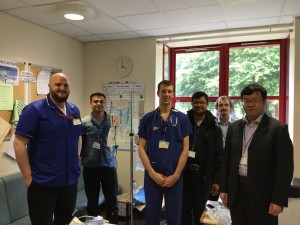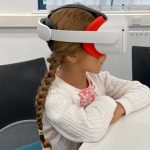
The project team from the Faculty of Science & Technology has received Higher Education Innovation Funding (HEIF) to undertake a series of activities aimed at encouraging university and the public sector to harness the benefits of advanced assistive technologies. (The HEIF project started last year and is due to finish at the end of July.)
The nature of HEIF funding encourages knowledge exchange and support to develop a broad range of knowledge based interactions between universities and colleges and the wider word, which result in economic and social benefit to the UK. In current clinical practices, urinary output measurement and supervision are prevailing medical intervention treatments for patients suffering from critical illness, aging bladder, post-surgery urination difficulties and long-term bedridden. However, the urinary output is still measured and monitored manually by healthcare staff, which is extremely time-consuming and prone to undesirable human errors commonly, arose in these repetitive and monotonous tasks. The project aims to invent an automatic device for remotely monitoring of urinary output, which features real-time remotely wireless catheter fall-off and flow rate monitoring, urinary output minute-by-minute monitoring and real-time states visualization.
The project team is made up of a number of researchers and students from multidisciplinary domains in addition to academics. The team (Prof Hongnian Yu, Mr Arif Reza Anwary; Mr Daniel Craven, Mr Muhammad Akbar, and Mr Pengcheng Liu) has recently presented their three developed prototypes at the collaborator’s site (Royal Bournemouth Hospital). The feedback and comments from the hospital staff are very positive. Dr Simon McLaughlin, the project collaborator from the Royal Bournemouth Hospital, said ‘The project looks to have progressed well. The work is excellent and the one of the prototypes is almost ready to deploy.’
The team hope to continue to consolidate the current developed prototypes and build on top of them to invent the commercially acceptable products.
 HEIF Funded Project: VR Igloo
HEIF Funded Project: VR Igloo HEIF – Frequently asked questions
HEIF – Frequently asked questions Cross-faculty team receive CyberASAP 22-23 funding from Innovate UK to develop HEIF funded project!
Cross-faculty team receive CyberASAP 22-23 funding from Innovate UK to develop HEIF funded project!










 Beyond Academia: Exploring Career Options for Early Career Researchers – Online Workshop
Beyond Academia: Exploring Career Options for Early Career Researchers – Online Workshop UKCGE Recognised Research Supervision Programme: Deadline Approaching
UKCGE Recognised Research Supervision Programme: Deadline Approaching SPROUT: From Sustainable Research to Sustainable Research Lives
SPROUT: From Sustainable Research to Sustainable Research Lives BRIAN upgrade and new look
BRIAN upgrade and new look Seeing the fruits of your labour in Bangladesh
Seeing the fruits of your labour in Bangladesh ECR Funding Open Call: Research Culture & Community Grant – Apply now
ECR Funding Open Call: Research Culture & Community Grant – Apply now ECR Funding Open Call: Research Culture & Community Grant – Application Deadline Friday 12 December
ECR Funding Open Call: Research Culture & Community Grant – Application Deadline Friday 12 December MSCA Postdoctoral Fellowships 2025 Call
MSCA Postdoctoral Fellowships 2025 Call ERC Advanced Grant 2025 Webinar
ERC Advanced Grant 2025 Webinar Update on UKRO services
Update on UKRO services European research project exploring use of ‘virtual twins’ to better manage metabolic associated fatty liver disease
European research project exploring use of ‘virtual twins’ to better manage metabolic associated fatty liver disease